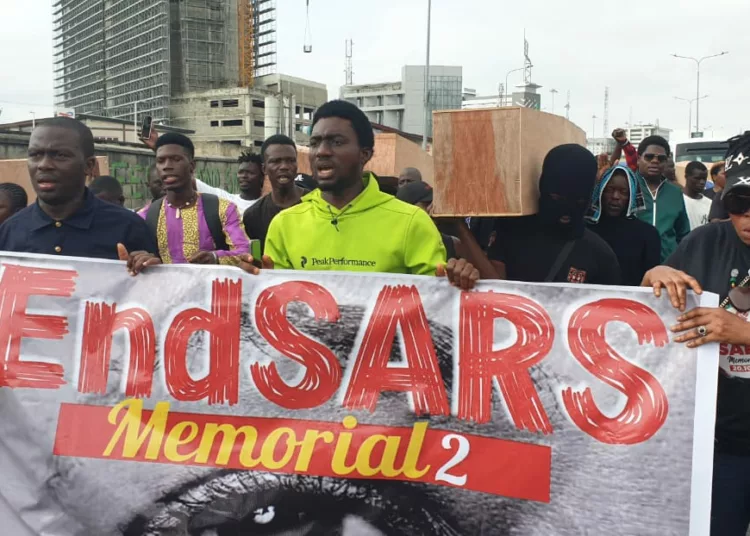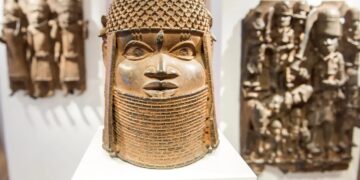It was exactly two years, yesterday, since the unfortunate incident at Lekki Toll Gate in Lagos, a culmination of the #EndSARS protest, took place. At that incident, security forces employed high-handedness to disperse unarmed youths, singing the national anthem and waving the national flag, who had gathered for days to demand an end to police brutality and better governance.
Before the protest was quelled, youths across Nigeria, coming under the hashtag #EndSARS, had engaged in protest marches across the country, calling for the disbandment of the Special Anti-Robbery Squad (SARS) set up by the police to tackle high-level violent crimes like armed robbery, rustling, arms trafficking and kidnapping, but which turned around to torment and extort money from innocent citizens.
Operatives of that discredited unit were alleged to profile young Nigerians, mostly males, based on fashion choices, tattoos and hairstyles. They were also known to mount illegal road blocks, conduct unwarranted checks and searches, arrest and detain without warrant or trial, rape women, and extort young male Nigerians for driving exotic vehicles and using laptops and iPhones.
Many of the police personnel allegedly hired themselves out to the highest bidders, and got involved in civil matters like rent collection, land and other communal disputes, master-apprentice disagreement, internet fraud (Yahoo Yahoo), and such other matters unconnected to violent crimes which were obviously off their mandate.
Two incidents of police killing triggered nationwide protests that culminated in the Lekki Massacre – as it came to be known. On October 3, 2020, a viral video showed a SARS policeman shooting a young Nigerian in front of Wetland Hotel, Ughelli, Delta State, and driving away his posh car – a Lexus SUV. The trending video caused public outcry on social media, especially on Twitter, with the #EndSARS hashtag trending, and two days later, another report surfaced of SARS officers killing a 20-year-old upcoming musician, one Daniel Chibuike, popularly called Sleek, in his neighbourhood.
Three days later, on Thursday October 8, 2020, nationwide protests began with youths in Nigerian and foreign cities demanding that the government do the needful about SARS. Government’s hurried disbandment of the unit did not assuage the protesters. They, in fact, made five demands: Immediate release of all arrested protesters; justice for all deceased victims of police brutality and appropriate compensation for their families; setting up of an independent body to oversee the investigation and prosecution of all reports of police misconduct; psychological evaluation and retaining of all disbanded SARS officers before they can be redeployed and increase of police salary so that they are adequately compensated for protecting lives and property of citizens.
Soon the peaceful protest turned violent after thugs attacked the EndSARS youths and security forces desirous to ending the standoff fired their guns, causing a stampede as protesters scampered for safety. Protesters claimed many youths were shot dead, but the government has consistently denied this claim.
Nevertheless, the actions of security forces drew local and international condemnation. Two years on from the Lekki incident, what has really changed? True, a few state governments set up judicial inquiries into complaints brought forward by victims of police brutality. In their sittings, some which were aired on television, victims recounted the horrors they suffered in the hands of security personnel. These reports have been submitted to state governments; however, there is no word that justice has been served – there is no record that compensation has been paid to victims and/or their families, and that the policemen accused of such heinous crimes are in jail or facing trial.
There is, also, no sign that the orientation of policemen has significantly changed in the way they relate with the public. It is true that the level of extrajudicial killing has abated, however, there is no let-up in their culture of bribe taking and extortion, as exemplified with the indictment of SARS’ starboy, Abba Kyari and his cohorts for two crimes: bribe taking from a now convicted international fraudster, Hushpuppi, and for drug peddling as revealed by an NDLEA sting operation.
Another demand of the youths was the release of all those detained for partaking in the protest. Two years later, some of them are still detained without trial, which is against the law, and those whose accounts were frozen for allegedly sponsoring the protests have yet to regain access to their deposits, which is also unlawful, unless the government can prove otherwise.
There is also no indication that the youths’ demand for psychological examination of former SARS operatives was carried out, despite assurances.
The only demand that the government has fulfilled was a slight increment in police salaries, which is commendable, but nowhere near enough for those who had signed up to defend the state with their lives. The result is that many of them still depend on unethical, even criminal practices like bribe taking, extortion and begging, among others, to cater for their families.
As we remember the events of Lekki Toll Gate two years ago, we reiterate the call for better and more ethical policing and more professional handling of peaceful protests to avoid unnecessary loss of lives.
We’ve got the edge. Get real-time reports, breaking scoops, and exclusive angles delivered straight to your phone. Don’t settle for stale news. Join LEADERSHIP NEWS on WhatsApp for 24/7 updates →
Join Our WhatsApp Channel










